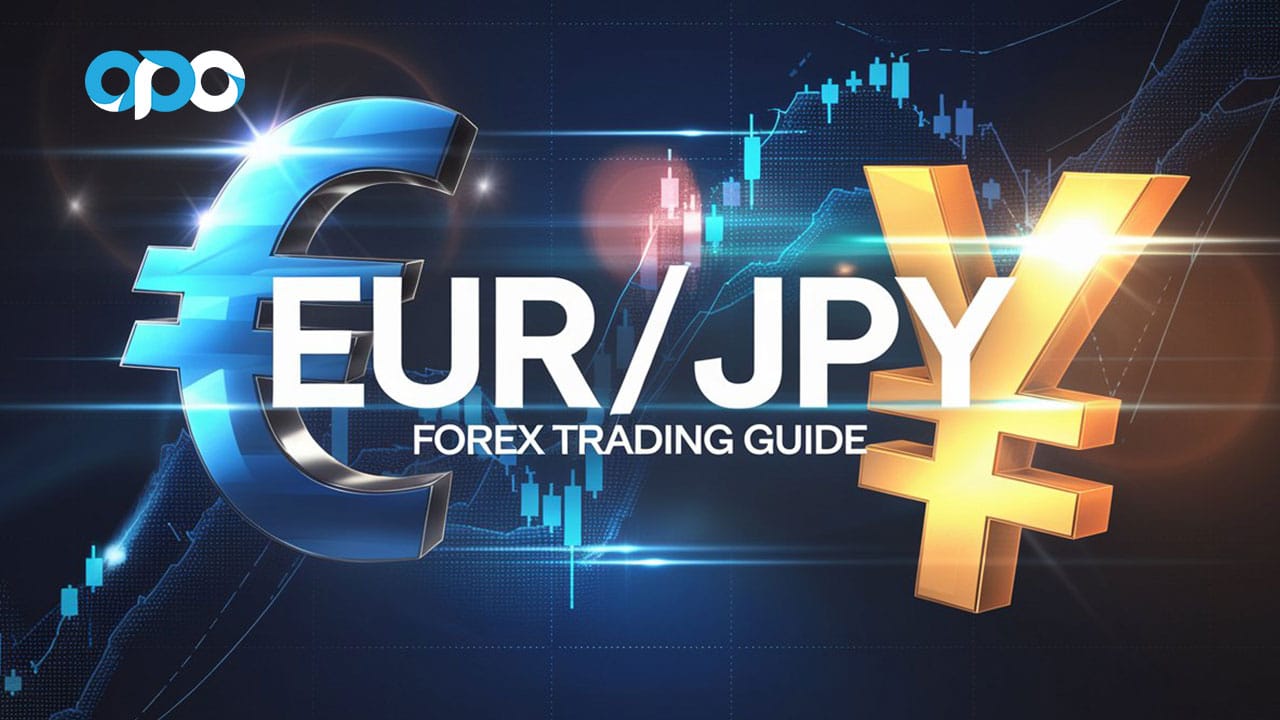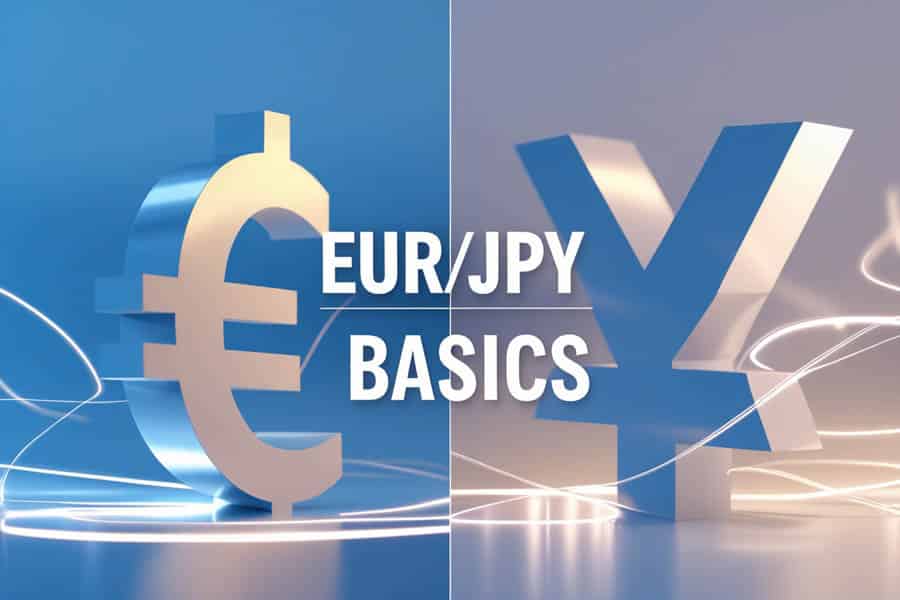Imagine navigating the vast seas of Forex trading with a compass that consistently points towards profitable opportunities. For many traders, mastering the EUR/JPY currency pair serves as that crucial compass, guiding them through the complexities of the foreign exchange market. Whether you’re an experienced trader seeking to diversify your portfolio or a newcomer eager to tap into lucrative markets, understanding what is EUR/JPY in Forex is paramount. Choosing the right regulated forex broker can significantly enhance your trading experience as you embark on this journey. This guide delves deep into the intricacies of EUR/JPY Forex trading, providing you with the knowledge and strategies needed to excel. From unraveling the fundamentals of this dynamic currency pair to exploring advanced trading techniques, you’ll gain invaluable insights that can enhance your trading prowess and maximize your financial gains.

Definition of EUR/JPY in Forex
At its core, EUR/JPY Forex trading involves the exchange rate between the Euro (EUR) and the Japanese Yen (JPY). This EUR/JPY currency pair represents how many Japanese Yen are required to purchase one Euro. In the Forex market, currency pairs are essential as they allow traders to speculate on the relative value of one currency against another. Here, the Euro serves as the base currency, while the Japanese Yen functions as the quote currency. The EUR/JPY exchange rate fluctuates based on various economic factors, making it a vital pair for traders aiming to capitalize on these movements.
Importance of the EUR/JPY Currency Pair in the Forex Market
The EUR/JPY currency pair holds significant importance in the Forex market for several reasons. Firstly, both the Eurozone and Japan are major economic powerhouses, making EUR/JPY one of the most traded pairs globally. This high trading volume translates to high liquidity, ensuring that trades can be executed swiftly and with minimal slippage. Additionally, the pair is known for its volatility, presenting numerous opportunities for traders to profit from price swings. The economic policies of the European Central Bank (ECB) and the Bank of Japan (BoJ), along with global economic events, heavily influence the EUR/JPY exchange rate, providing a dynamic trading environment. Understanding the nuances of this pair is essential for traders looking to diversify their portfolios and leverage the economic interplay between Europe and Asia.
Understanding EUR/JPY

In the realm of Forex, currencies are traded in pairs, reflecting the relative value between two currencies. Each currency pair consists of a base currency and a quote currency. The base currency is the first currency listed in the pair, while the quote currency is the second. The exchange rate indicates how much of the quote currency is needed to purchase one unit of the base currency. For example, in the EUR/JPY pair, the Euro (EUR) is the base currency, and the Japanese Yen (JPY) is the quote currency. Understanding how these pairs operate is fundamental to Forex trading, as it allows traders to speculate on the appreciation or depreciation of one currency against another, thereby profiting from the fluctuations in exchange rates.
Role of the Euro (EUR) as the Base Currency
The Euro (EUR) is the official currency of the Eurozone, which comprises 19 of the 27 European Union member states. Introduced in 1999, the Euro was established to foster economic integration and streamline trade within the region. As the base currency in the EUR/JPY pair, the Euro’s value is influenced by a myriad of factors:
- European Central Bank (ECB) Policies: Decisions regarding interest rates, quantitative easing, and other monetary policies directly impact the Euro’s strength.
- Economic Indicators: GDP growth, unemployment rates, inflation, and trade balances within the Eurozone are critical in determining the Euro’s value.
- Political Stability: Political events, such as elections, referendums, and policy changes within Eurozone countries, can lead to significant fluctuations in the Euro’s value.
- Market Sentiment: Global investor sentiment towards the Eurozone economy affects the demand for the Euro, thereby influencing the EUR/JPY exchange rate.
These factors collectively determine the Euro’s performance in the Forex market, making it a vital currency for traders to monitor when engaging in EUR/JPY Forex trading.
Role of the Japanese Yen (JPY) as the Quote Currency
The Japanese Yen (JPY) is the official currency of Japan and is renowned as a safe-haven currency. In the EUR/JPY pair, the Yen’s value plays a pivotal role and is influenced by several key factors:
- Bank of Japan (BoJ) Policies: The BoJ’s monetary policies, including interest rate decisions and quantitative easing measures, play a crucial role in determining the Yen’s value.
- Economic Performance: Indicators such as Japan’s GDP growth, industrial production, and trade balances are significant determinants of the Yen’s strength.
- Global Economic Conditions: As a safe-haven currency, the Yen often appreciates during times of global economic uncertainty or geopolitical tensions, as investors seek stability.
- Trade Relationships: Japan’s trade relationships, particularly with the Eurozone, impact the demand for the Yen, influencing the EUR/JPY exchange rate.
Understanding the interplay between the Euro and the Yen is essential for traders aiming to predict and capitalize on movements within the EUR/JPY Forex trading pair.
Read More: Cross Currency Pairs in forex
Historical Context

Introduction of the Euro in 1999
The Euro was officially introduced on January 1, 1999, as an electronic currency used for banking and financial transactions, with physical banknotes and coins entering circulation in 2002. The introduction of the Euro marked a significant milestone in European economic integration, replacing multiple national currencies to streamline trade and economic policies within the Eurozone. This unification aimed to eliminate exchange rate fluctuations between member countries, fostering a more stable and predictable economic environment. The Euro’s establishment has had profound implications for Forex trading, as it became one of the world’s primary reserve currencies, enhancing its liquidity and significance in the global financial markets.
Historical Performance of EUR/JPY
Since its inception, the EUR/JPY pair has exhibited considerable volatility, influenced by various economic and geopolitical events. Key historical milestones include:
- Early 2000s Stability: Following its introduction, the EUR/JPY pair experienced relative stability as markets adjusted to the new currency.
- 2008 Financial Crisis: The global financial meltdown led to extreme volatility in EUR/JPY as investors flocked to safe-haven assets like the Yen, causing significant fluctuations.
- Eurozone Debt Crisis (2010-2012): Concerns over sovereign debt in countries like Greece and Italy weakened the Euro against the Yen, increasing the pair’s volatility.
- Brexit Referendum (2016): The uncertainty surrounding the UK’s exit from the European Union introduced further instability in the Euro, impacting EUR/JPY.
- COVID-19 Pandemic (2020): The pandemic triggered unprecedented market volatility, with EUR/JPY reacting to economic stimulus measures and varying recovery rates across the Eurozone and Japan.
Analyzing these historical trends provides traders with valuable insights into potential future movements and the factors that drive the EUR/JPY exchange rate, enabling them to make more informed trading decisions.
Significant Economic Events Affecting EUR/JPY
Several major economic events have historically impacted the EUR/JPY currency pair:
- 2008 Financial Crisis: The crisis led to a flight to safety, with the Yen strengthening against the Euro as investors sought refuge from market instability.
- ECB and BoJ Policy Changes: Interest rate adjustments, quantitative easing, and other policy measures by the European Central Bank and the Bank of Japan have directly influenced the EUR/JPY exchange rate.
- Brexit Referendum (2016): The uncertainty and potential economic fallout from the UK’s exit from the EU weakened the Euro, affecting its performance against the Yen.
- US-China Trade War (2018-2019): Trade tensions impacted global economic stability, influencing the EUR/JPY pair as investors reacted to changing market conditions.
- COVID-19 Pandemic (2020): The pandemic’s economic repercussions led to significant fluctuations in the EUR/JPY exchange rate as both the Eurozone and Japan responded with varying fiscal and monetary policies.
- Geopolitical Tensions: Events such as the Russia-Ukraine conflict have broader implications for global markets, including the EUR/JPY pair, as they affect investor sentiment and economic stability.
Understanding the impact of these events is crucial for traders aiming to anticipate and navigate the volatility in the EUR/JPY Forex trading pair, allowing them to adjust their strategies accordingly.
Factors Influencing EUR/JPY

Monetary Policies of the European Central Bank (ECB)
The European Central Bank (ECB) plays a pivotal role in shaping the EUR/JPY exchange rate through its monetary policies. Key aspects include:
- Interest Rate Decisions: Changes in interest rates affect the Euro’s attractiveness to investors. An increase in Eurozone interest rates typically strengthens the Euro against the Yen, while rate cuts can weaken it.
- Quantitative Easing (QE): The ECB’s QE programs, which involve large-scale asset purchases to inject liquidity into the economy, can lead to a depreciation of the Euro by increasing the money supply.
- Forward Guidance: The ECB’s communication regarding future monetary policies influences market expectations and, consequently, the EUR/JPY exchange rate.
For instance, during periods of economic uncertainty, if the ECB adopts a dovish stance by lowering interest rates or implementing QE, the Euro may weaken against the Yen as investors seek higher returns elsewhere. Conversely, a hawkish stance can bolster the Euro’s strength, making EUR/JPY an attractive pair for traders.
Monetary Policies of the Bank of Japan (BoJ)
Similarly, the Bank of Japan (BoJ) significantly impacts the EUR/JPY pair through its monetary policies:
- Interest Rate Adjustments: The BoJ’s decisions to raise or lower interest rates directly affect the Yen’s value. Lowering rates can lead to Yen depreciation, while raising rates can strengthen the Yen against the Euro.
- Quantitative and Qualitative Monetary Easing (QQE): The BoJ’s aggressive QE measures aim to stimulate the Japanese economy by increasing liquidity, which can result in a weaker Yen.
- Yield Curve Control (YCC): By targeting specific interest rates on government bonds, the BoJ influences long-term interest rates, impacting the Yen’s attractiveness to investors.
For example, if the BoJ implements further QE or maintains low interest rates, the Yen may weaken against the Euro, making the EUR/JPY pair more favorable for traders looking to capitalize on a stronger Euro.
Read More: Types of Currency Pairs in Forex
Economic Indicators from the Eurozone and Japan
Economic indicators from both the Eurozone and Japan are crucial in determining the EUR/JPY exchange rate. Key indicators include:
- Gross Domestic Product (GDP) Growth: Strong GDP growth in the Eurozone relative to Japan can strengthen the Euro against the Yen, and vice versa.
- Unemployment Rates: Lower unemployment rates in the Eurozone can signal economic strength, boosting the Euro, while higher rates may have the opposite effect.
- Inflation Rates: Higher inflation in the Eurozone can lead to interest rate hikes by the ECB, strengthening the Euro. Conversely, low inflation in Japan may prompt the BoJ to maintain or lower interest rates, weakening the Yen.
- Trade Balances: A positive trade balance in the Eurozone can increase demand for the Euro, while a trade deficit can weaken it. Similarly, Japan’s trade balance influences the Yen’s value.
For example, if the Eurozone reports higher-than-expected GDP growth while Japan’s growth stagnates, the Euro may appreciate against the Yen, positively impacting the EUR/JPY exchange rate. Monitoring these indicators provides traders with critical insights into the economic health of both regions, enabling more informed trading decisions.
Global Economic Events and Their Impact on EUR/JPY
Global economic events and geopolitical developments have a profound impact on the EUR/JPY currency pair:
- Geopolitical Tensions: Conflicts, trade wars, and political instability can create uncertainty, leading investors to seek safe-haven currencies like the Yen, thereby strengthening the Yen against the Euro.
- Global Financial Crises: Economic downturns or financial crises can increase market volatility, influencing the EUR/JPY exchange rate as investors adjust their portfolios to mitigate risks.
- International Trade Agreements: Changes in trade policies or agreements between major economies can affect the Euro and Yen’s demand, impacting the EUR/JPY pair.
- Commodity Prices: Fluctuations in global commodity prices, such as oil and gold, can influence the currencies of commodity-exporting nations, indirectly affecting the EUR/JPY exchange rate.
For instance, heightened geopolitical tensions in Europe or Asia can lead to increased demand for the Yen as a safe-haven currency, resulting in a stronger Yen against the Euro. Similarly, global financial instability can drive investors towards the Yen, impacting the EUR/JPY pair’s dynamics. Staying attuned to these global events is essential for traders aiming to anticipate and respond to shifts in the EUR/JPY exchange rate effectively.
Mastering EUR/JPY Trading Strategies

Popular Trading Strategies Used for EUR/JPY
Effective trading strategies for EUR/JPY include:
- Trend Following: Identifying and trading in the direction of the prevailing trend.
- Range Trading: Capitalizing on the pair’s movement within established support and resistance levels.
- Breakout Trading: Entering trades when the pair breaks out of defined ranges, signaling a potential new trend.
- Carry Trade: Exploiting interest rate differentials between the Eurozone and Japan to earn interest income.
Technical Analysis Tools Applicable to EUR/JPY
Traders often use technical analysis tools to predict EUR/JPY movements:
- Moving Averages: To identify trend directions and potential reversals.
- Relative Strength Index (RSI): To gauge the pair’s momentum and identify overbought or oversold conditions.
- Bollinger Bands: To assess volatility and potential breakout points.
- Fibonacci Retracement Levels: To identify potential support and resistance zones based on historical price movements.
Risk Management Practices for Trading EUR/JPY
Effective risk management is crucial for EUR/JPY trading success:
- Setting Stop-Loss Orders: To limit potential losses on each trade.
- Position Sizing: Ensuring that no single trade disproportionately affects your overall portfolio.
- Diversification: Spreading investments across different currency pairs to mitigate risk.
- Regularly Reviewing Trades: Analyzing past trades to identify and rectify mistakes.
Advantages of Trading EUR/JPY
High Liquidity of the EUR/JPY Pair
EUR/JPY is one of the most liquid currency pairs, ensuring that trades can be executed quickly and with minimal slippage. High liquidity also means tighter bid-ask spreads, reducing trading costs.
Volatility and Trading Opportunities in EUR/JPY
The EUR/JPY pair is known for its volatility, offering numerous trading opportunities. This volatility is driven by the dynamic economic environments of the Eurozone and Japan, providing traders with ample chances to capitalize on price movements.
Correlation of EUR/JPY with Other Financial Instruments
EUR/JPY often correlates with other financial instruments such as stock indices and commodities. For instance, a strong Euro might coincide with rising European stock markets, offering insights for multi-asset trading strategies.
Read More: Safe Haven Currency Pairs
Risks Associated with EUR/JPY Trading
Potential Risks in Trading EUR/JPY
While EUR/JPY offers many opportunities, it also comes with risks:
- Market Volatility: Sudden price swings can lead to significant losses if not properly managed.
- Leverage Risks: High leverage can amplify both gains and losses.
- Economic Uncertainties: Unexpected economic events can disrupt the pair’s stability.
Impact of Geopolitical Events on EUR/JPY
Geopolitical tensions, such as trade disputes or political instability in the Eurozone or Japan, can lead to increased volatility and unpredictable movements in the EUR/JPY pair.
Importance of Staying Informed About Economic News
Staying updated with the latest economic news and developments in the Eurozone and Japan is essential. Economic releases, central bank announcements, and geopolitical events can all impact the EUR/JPY exchange rate, influencing trading decisions.
OpoFinance: An ASIC-Regulated Solution for EUR/JPY Trading
Trading EUR/JPY requires a reliable, regulated broker, and OpoFinance stands out with its ASIC regulation, ensuring a secure trading environment for investors. As an officially featured broker on the MT5 brokers list, OpoFinance provides traders with robust tools and services for effective EUR/JPY trading:
Regulatory Security and Trust
- ASIC regulation ensures strict compliance with financial standards
- Regular audits and oversight maintain operational transparency
- Protected client funds through segregated accounts
Advanced Trading Platform Access
- Official MT5 platform integration for sophisticated trading tools
- Advanced charting capabilities for EUR/JPY analysis
- Real-time market execution for precise entry and exit points
Convenient Financial Operations
- Safe and secure deposit methods
- Quick withdrawal processing
- Multiple payment options for global traders
Social Trading Features
For traders interested in EUR/JPY, OpoFinance’s social trading service offers:
- Ability to follow successful EUR/JPY traders
- Copy trading functionality for automated position replication
- Community insights into EUR/JPY market movements
- Learning opportunities from experienced traders
Trading Conditions
- Competitive EUR/JPY spreads
- Fast execution speeds
- Professional market analysis and support
- Educational resources for trading development

This comprehensive service package makes OpoFinance a considerable choice for traders looking to engage in EUR/JPY trading through a regulated platform with modern trading capabilities.
Conclusion: Navigating the EUR/JPY Landscape with Confidence
Understanding what is EUR/JPY in Forex is fundamental to unlocking the vast trading opportunities this currency pair offers. The EUR/JPY pair stands out due to its high liquidity, significant volatility, and the economic influence of both the Eurozone and Japan. By comprehensively grasping the factors that drive the EUR/JPY exchange rate, such as monetary policies, economic indicators, and global events, traders can make informed and strategic decisions. Implementing effective trading strategies, coupled with robust risk management practices, enables traders to capitalize on the pair’s movements while mitigating potential risks. Staying informed about economic news and leveraging expert insights further enhances your ability to navigate the dynamic EUR/JPY landscape confidently. Whether you’re aiming to diversify your trading portfolio or seeking to maximize your Forex trading potential, mastering the intricacies of EUR/JPY can lead to sustained trading success and profitability.
Key Takeaways
- EUR/JPY Defined: Represents the exchange rate between the Euro and Japanese Yen, a crucial and highly liquid Forex currency pair.
- High Liquidity & Volatility: Offers numerous trading opportunities due to its significant liquidity and volatility, but requires effective risk management.
- Influencing Factors: Central bank policies, economic indicators, and global events significantly impact the EUR/JPY exchange rate.
- Strategic Trading: Combining technical and fundamental analysis, monitoring central bank communications, and maintaining discipline are essential for success.
- Risk Management: Implementing stop-loss orders, position sizing, and diversification helps mitigate risks associated with EUR/JPY trading.
- Stay Informed: Keeping up with economic news and geopolitical developments is vital for making informed trading decisions.
- Expert Insights: Utilizing automated trading tools, adhering to a trading plan, and continuous learning enhance trading effectiveness.
How does the interest rate differential between the ECB and BoJ affect EUR/JPY?
The interest rate differential between the European Central Bank (ECB) and the Bank of Japan (BoJ) plays a significant role in determining the EUR/JPY exchange rate. When the ECB raises interest rates while the BoJ maintains or lowers its rates, the Euro becomes more attractive to investors seeking higher returns, potentially strengthening the EUR/JPY pair. Conversely, if the BoJ raises rates or the ECB lowers them, the Yen may appreciate against the Euro. This differential influences capital flows, as investors move funds to currencies offering better returns, directly impacting the demand and supply dynamics of EUR/JPY. Understanding these interest rate dynamics is crucial for predicting and capitalizing on EUR/JPY movements.
What are the best times to trade EUR/JPY for optimal volatility?
The best times to trade EUR/JPY Forex trading are during the overlapping trading hours of the European and Asian sessions. Specifically, the hours between 7:00 AM and 11:00 AM GMT often exhibit higher volatility and trading volumes, providing more opportunities for profitable trades. Additionally, trading around major economic releases from the Eurozone and Japan can enhance volatility, creating favorable conditions for traders. These periods of heightened activity can lead to more significant price movements, allowing traders to capitalize on the increased market activity and liquidity. Timing your trades during these peak periods can improve the likelihood of successful trades in the EUR/JPY pair.
How can geopolitical events in Europe impact the EUR/JPY exchange rate?
Geopolitical events in Europe, such as elections, referendums, or political instability, can significantly impact the EUR/JPY exchange rate. These events can create uncertainty in the markets, leading to increased volatility as traders react to potential economic and political changes. For example, a political crisis in a major Eurozone country may weaken the Euro against the Yen as investors seek safe-haven currencies like the Japanese Yen. Additionally, changes in trade policies or international relations can alter investor sentiment and capital flows, further influencing the EUR/JPY pair. Staying informed about geopolitical developments is essential for anticipating and responding to their effects on the EUR/JPY exchange rate.







